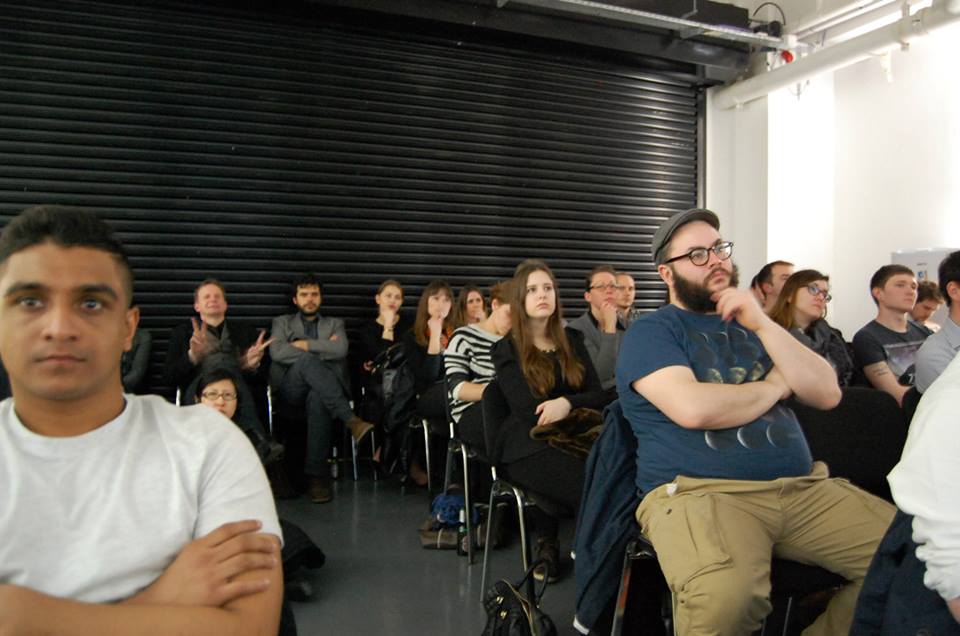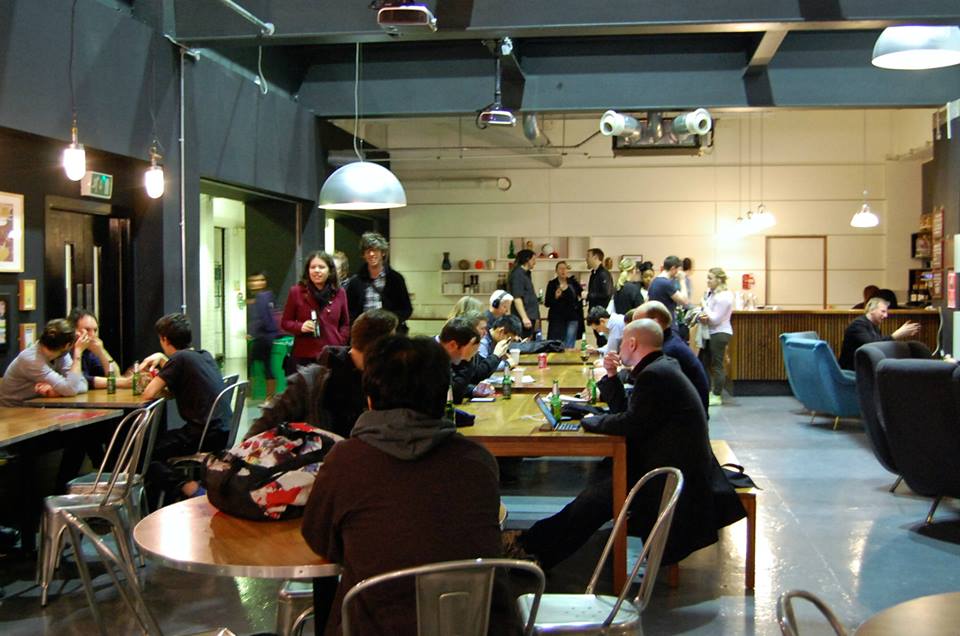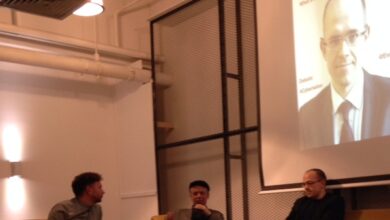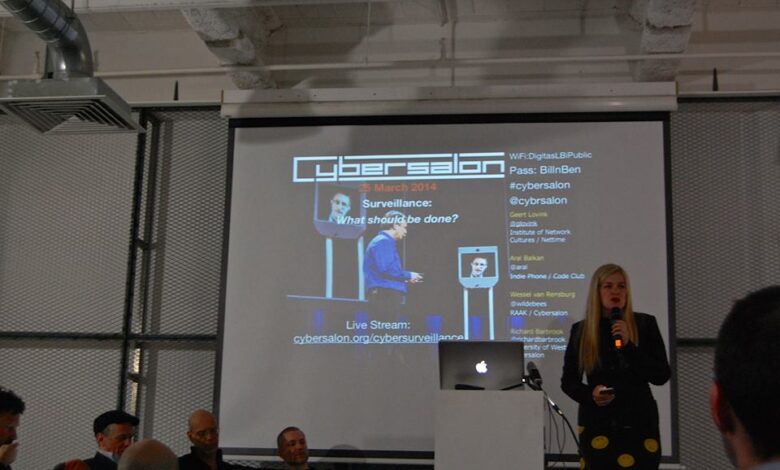
Summary- Surveillance: What Should be Done?
How do we take back the Internet for ourselves, as Edward Snowden wants us to?
Tuesday, 25 March 2014, London.
The video of the event: choose your speaker via the playlist on the side bar!
Summary written by Alexandra Reynolds (edit by Niki Gomez).
Eva Pascoe: Tim Berners Lee has called for a Digital Bill of Rights (Magna Carta). We want to write our own with your help and so today is to flush out the issues to prepare the grounds for writing up a draft for the digital bill of rights.
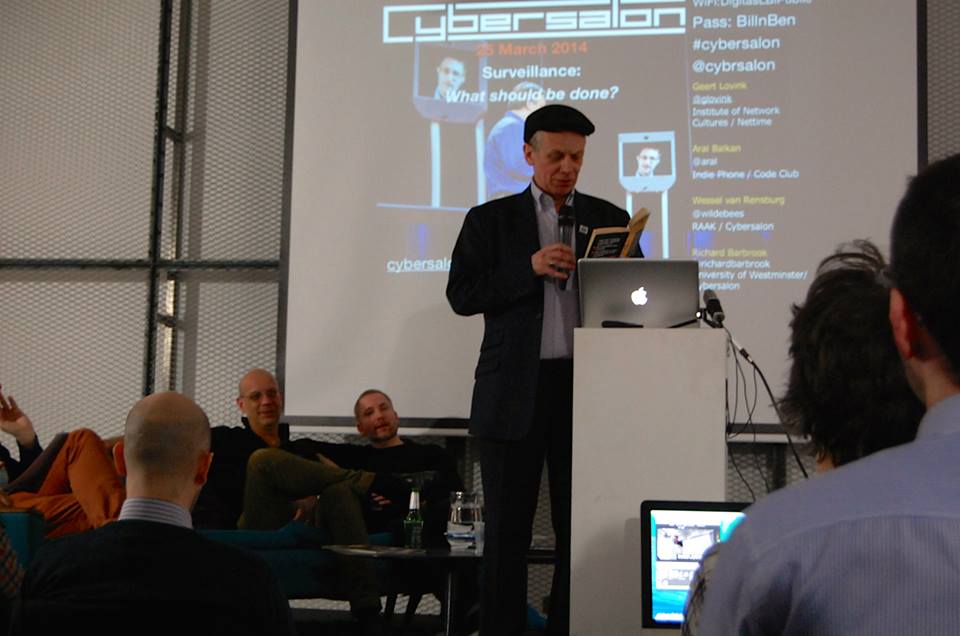
Richard Barbrook: Tonight we’ll have 2 long talks from our speakers Geert and Aral and then Wessel will wrap up with 10 minute talk.
England after 1688 revolution had bill of rights. It seems this is something built on in US. Think about rights – they are for individuals – male property owners. How would we have a bill of rights for the 21st century as networked individuals? We want to collectively organise and also want to be able to have privacy. I refer to the book ‘The Beast of Business’ by Harvey Matusow – a record of computer atrocities. There’s a cheerful obedience to the computer which helps dictators, and means selling out. We must fight the computer – you are supreme and the computer is subservient- remember that!
To introduce the speaker: first up will be Geert Lovink – I’ve known him for a long time, he was the king of the squatters in Amsterdam. Before the Net he was involved in pirate and community mailing lists. He set up the Nettime conferences and the Next 5 Minutes. Liked the Net but not the neoliberal ideologies. Conceptualised the tactical media movement. Published ‘Dark Fibre’ and ‘Networks Without a Cause’ most recently. Also, ‘The Unlike Us Reader’ – a good critique of social media.

Geert Lovink – Institute of Network Cultures/ Nettime
It has been a while since I’ve been in London. I returned from Australia in 2004 and was given a unique opportunity to start our own research centre, now it’s our 10th birthday! We set up research networks to critique and organise or intervene and built networks of researchers, activists, artists and programmers. This is the legacy of Next 5 Minutes. I cannot think of a world without art or aesthetics. These are organising disciplines and structures brought together. Society of the query is a project on Wikipedia and the politics and aesthetics of search engines. Moneylab: coining alternatives is another one. One interest is alternatives in social media. It is easy to complain about the dominance of Facebook and Twitter but what to do about it? This question is important tonight in this presentation. We bring these things together and put them out in a reader and put them in print and online too.
The question here is what to do after Snowden. A lot has already been done- practices and politics of alternative platforms. There are a lot of privacy scholars and the bill of rights will focus on this but I believe politics is informed by doing – writing software and lived practices. These abstract rights need to materialise, they are empty if not lived. Friendica is one of many alternative social media platforms developed over the past few years. At least in 2011 up to June 2013 when the Snowden revelations came out, this was pretty much the party line. This was where a lot of activists were focused. A large array of software and open source. For most users the internet means social media. Whether we like it or not, we can critique it, but for many activists this was the starting point.
June 2013 was an important moment for the hacker movement. ObserveHackMake 2013 was the key moment. It was unlike the Chaos computer club where the hacker community was split up into big factions. This one served the computer industry and a big new generation of hackers who would not continue to work for the NSA and big firms. There was a real rupture within the community which is important to understand. A few activists went to the sponsor of the big hacking event and sprayed NSA on it. These people were kicked out. Everyone found themselves in a highly politicised situation.
There were other expressions – from joyous to dark Deleuze. From corporate to revolutionary Deleuze. I am now working to translate this information into English, and expressing the new theoretical foundations of a new generation after Snowden. It starts with a loss of control. A materialist reading of society starts there. How can we regain and express our rights again? Ctrl + verlust – starts with a new game, the need for this. People since Snowden have also started to map everything that is going on. This becomes very complex and part of the problem. Mapping the new initiatives – it becomes a confusing field. Where to start and where is the politics here? The politics is in all the layers, but how do we translate this? We need to bring it together, summarise and energise this. The bill of rights would help to do this, to summarise ideas and design principles.
For me it is very important to politicise this level, because we can already see with the response of corporations to Snowden that cloud computing is not being questioned. If the bill of rights is not addressing centralisation of telecommunication infrastructures it is not doing its job.
Thee are 3 types of Internet Structures:
Centralised, Decentralised and Distributed. We need to dismantle the cloud and make explicit the centralisation which is going on. This centralisation can be seen in bandwidth and traffic also. If the internet is a decentralised network then why is there still a huge focus on certain countries? Brazil wants own cyberstructure. All traffic coming from Brazil needs to go through the US, this needs to stop. Need to build cables to Africa, Europe and Asia. Could say we need to invest more in infrastructure. The movement is called redecentralisation. Redecentralise.org. What is going on now is part of this movement. We have had an indication of how the new infrastructure would look – it would be a Federated Web – with a distributed version would be ideal. A lot of activists and software writers propose we should have a federated web. In order to get there must make explicit the current powers. I am still looking for an image of what the federated web will look like- we need to create its design- it’s not created as yet! It’s as yet ideological.
I have been working on organised networks, not networks with weak ties and I emphasise the importance of the strong ties as they are smaller. Facebook exploited the desire to connect to friends of friends. In neoliberal times the idea is that the more friends you have the better. We have projected this onto the immense network. If we grow it we will be safe. This is the internal logic – pretty sick and starts to work against us. This is why we are now working on the design principles on the smaller organised networks.
Over the last months there’s been a huge growth of anonymous apps Secret, Keybase, Snapchat. This kind of software and even commercial response to earlier anonymous movements, is to be a collective and to communicate anonymously. Mediamatic in Amsterdam and Moby. Opaque presence –the most advanced theory is about masks and metamorphosis. There is a lot of inspiring literature and an enormous amount of writing about masks in anthropology which can help to understand design principles and how they should look.
[Shows an image of a bag to put your phone in so that signals cannot go out.]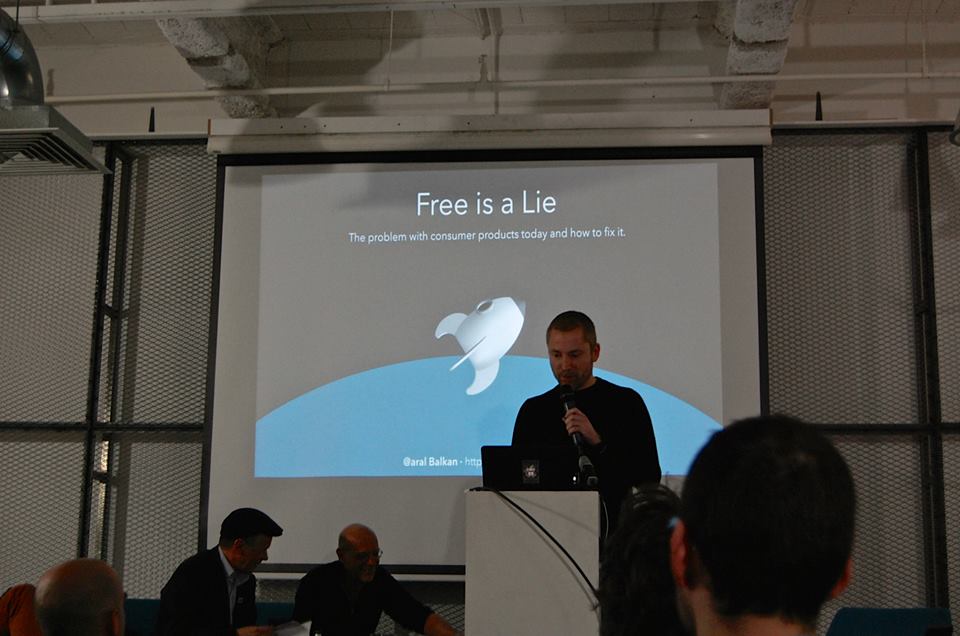
Aral Balkan – Indie Phone/ Code Club
Technological solutions – I want to empower people to make their own stuff, I started indie phone, board of code club. [Shows a graph when Facebook knows you have started a new relationship, before you have made it official]. It uses the number of timeline posts. FB has intelligence about you and might know before you know! This brings into question: who owns this data and intelligence? Is this publicly available? No not even anonymised data. Who owns our data? In this case it is Facebook quite clearly and they will not make share it. Facebook bought WhatsApp for US$19bn. What were actually bought were 450 million phone numbers and the ability to listen to those phone lines. To understand why this is a problem have to understand the world we live in. Computers now are very personal and we wear them. Other companies who own our data are Apple, Google and Twitter. And they are all closed, with ‘free’ business models.
Now computers know of the world around us, and one another. Also we are, via these devices cyborgs, we can manipulate and experience reality through them. So it is important they work well. If so they empower us, if not they enfeeble us. But a handful of companies own these things. They are all closed and some share a certain business model of free in exchange for data.
Schnail Mail is a product that solves the problem of real mail. Here you get free real mail sent to you forever. The caveat is that your letters are opened and read, but they only do this for a specific purpose to get to know you better and help you. You won’t even know that they opened your mail!
Gmail also uses algorithms for the same purpose. Google’s business model is to monetize data. Google needs data to grow and gets it through certain ways. Google has lots of services. Google Maps knows where you are. Gmail will also look at all of your friends’ data- so when you choose to use Gmail you are exposing everyone who has contact with you to their mail being read also. Recaptcha means Google can get more information- the second Recaptcha code is for checking text in Google Books. Ingress is a game which is free but gets pedestrian pattern data. Why is it that Google Nexus is much cheaper than an iPhone? Google’s smart products are subsidised because of the user data they generate. However Google are clever, you can also use an iPhone and they will still get valuable data from you through their apps. These companies need data to grow, so they need to enable connectivity. This is what Google is doing with Google Fiber. These companies also want to get the next billion online. As if it is the most important thing in the world that the next billion start using Facebook! Google wants to give this access via Google Loon. Facebook wants to do the same thing with internet.org. Free services need data to survive. If you are not paying you are the quarry being mined, we are the new natural resources.
We are back to AOL days, we’re doing it again, but doing things in a different way. In a more powerful way. We now have regulation. So what? There is no way to not share. After 9/11 the Information Awareness Office was set up [shows their logo]- and this is actually their logo! All the companies trusted with information were part of Prism. It is more expensive to surveil data personally, much easier to do it from a central space, and the NSA was also getting it from the pipes.
Eric Schmidt Google’s CEO says this lack of personal privacy is part of the culture we live in and if you have things you do not want people to know then you should not do them. But privacy is not about if you have something to hide, more about whether you should have the space not to share. Snapchat and Secret are supposedly anonymous, but these companies still have all the data. Privacy is a fundamental human right (as acknowledged in Article 19 of the UN Universal Declaration of Human Rights) and so Google is actually a threat to human rights. Digital feudalism means have the option to own our own data.
I recommend you watch the documentary “Terms and Conditions May Apply”, if you haven’t already.
The solution is Free and Open technology. Yes we can own our own git repository, configure to own server and ask friends and families to do the same. The difficulty is that just because something is free does not mean it is open. Open often does not work and that it is difficult to use and create for. We have to make it work for the wider public or we enfeeble them. The technology interfaces (UX) of Open Source software is often a problem. There is a diversity problem in free and open. Open source is features led, still living in time gone by when features were important which is anachronistic. We have feature parity in a consumer market, so we don’t need to prioritise this any longer. We need something else also – to design usability into Open Source. The age of features is dead and now living in experience age.
We are harbouring trickle down technology. This does not work. We are still waiting for technology trickle down, which like economic trickle down, simply will not happen. Good design needs to come from the top down, from the Enthusiasts who do not currently make solutions for consumers. Google etc. has control over hardware, software and connectivity. Need a new category of open tech – experience driven open. This will empower regular people to use open. This is Indie technology. We need Indie technology, made by enthusiasts to be simple technology, targeted at the consumer market.
[Aral goes through his experience in slides with the Mozilla phone, claiming the UX is badly designed].This is not the only problem with Mozilla, rather that they get 90% income from Google. That is why I am building the Indie phone that has its own operating system, and cloud and this will be a combination of best UX practices. Our business model will be to charge for the phone, and we are raising money through crowd funding to produce it. It is deeply empowering – in the here and now in terms of civil liberties and long term human rights. Please keep creating crazy things- it is what the world needs now!
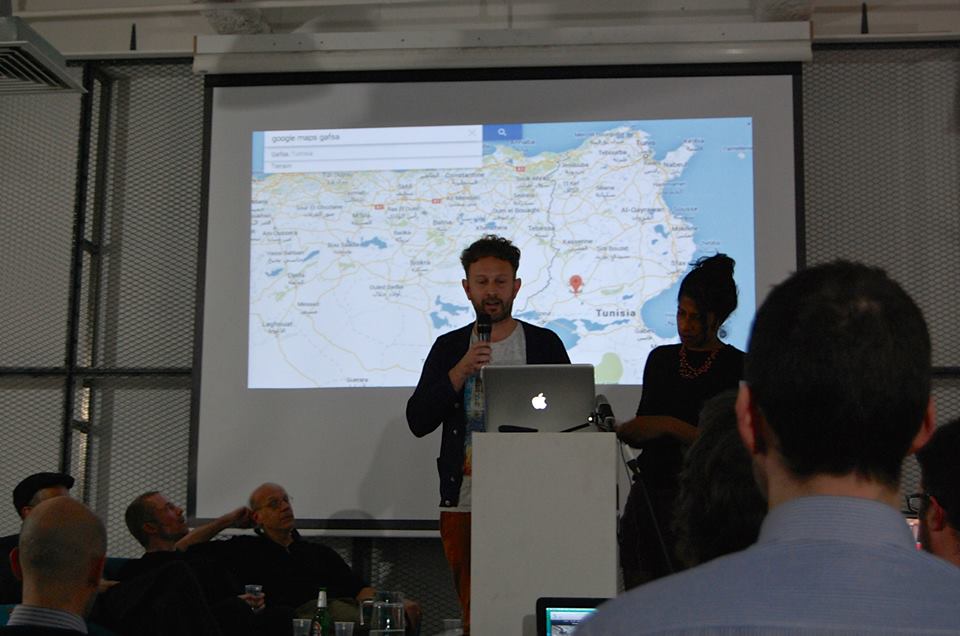
Wessel Van Rensburg – RAAK/ Cybersalon
I’m a Digital and Social Media strategist. I’ll be discussing a few issues which problematize the talks. The importance of design and UX when it comes to politics is key. After listening to Aral’s talk, how do you evade backbone issues of surveillance in the Indie phone?
Starting my talk I will show how media companies have helped expression and how advertising is not the only cause of corrpution. [Wessel shows a map of Tunisia] In Gafsa there was a protest hardly anyone knows about it. In March 2010, Facebook Zero was produced – it subsidized the use of the internet for new users of Facebook. 2 million people suddenly using FB, and the speed of traffic overwhelmed the authorities. Facebook was closed and was reopened in that year.
Advertising helped stop the shutting of my university paper. It is a tried and tested business model. Noam Chomsky (MIT) talks about mass media and how consent is manufactured. However, this consent is also manufactured through the BBC although it is a public service. Does social media enable the manufacturing consent? I do not think so. Women’s voices are better heard through social media than ever before. A study by Duncan Watts looks at what is being said to who on Twitter- it found that general people’s voice is the biggest share of use. Although media outlets are active, the elite get 50% of visibility on Twitter. Social Media companies earn less money than others but they get more attention because they matter.
What about ads? They subsidise. If FB was a paid for service many people would not be able to pay for it and you would have a rich men’s club at the top.
I agree with Aral that UX also matters with digital tools. I disagree with Geert about weak ties, I am interested in the interesting people you meet on the internet who are not part of your usual social network. Cliques = strong ties. I am interested in discovering people and ideas through weak ties.
The EU Parliament has an interesting future ahead of it. The new movement passed means opting in and responsibility. What is to be done? Lawrence Lessig talks about 4 elements: law, market, architecture (that is code in this case) and norms – we have been obsessed with the market and with architecture for so long, and are not talking about the norms and law. Which is politics- configuring the network self. Semantic discontinuity is a feature in analogue world. We want to aim for this digitally.
Conclusions
The audience voted between:
1. Encryption and technical solutions
2. Independent technology (away from free data business models)
3. Using the law to put our data under our control
The audience voted for the the third option: using the law.
To do this, we encourage everyone to write to their local MP. This may sound old-fashioned, but it’s the only way this process can start.
1. Find your MP here (uses your postcode) or here
If you’re not registered to vote for local and EU elections, register here. (For all EU ctizens)
2. Send them a copy of our template letter to your MP, in your name. You may send this by email or by post.
We thank you for your active participation in changing things!
